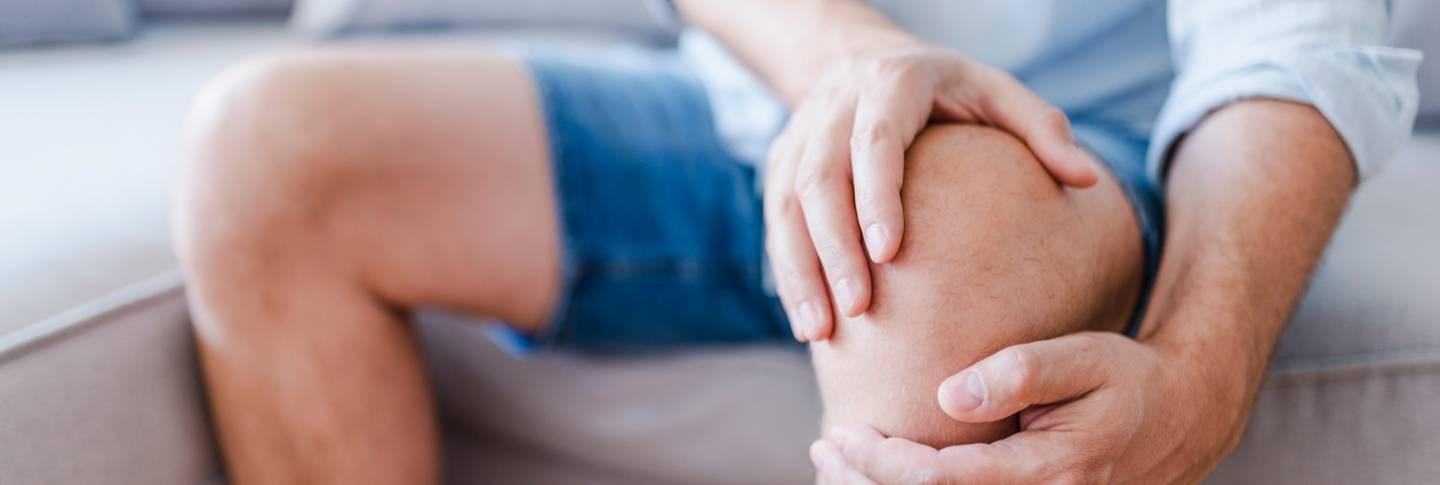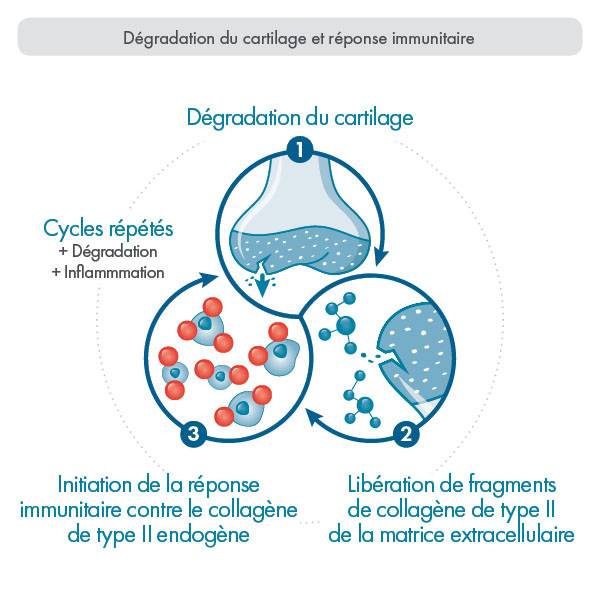
Collagen and joints: How to improve joint health?
Joints and bone capital
Essential to the proper functioning of joints, cartilage belongs to the family of connective tissues and provides flexibility and elasticity. Cartilage is composed of many molecules, including type II collagen, and is responsible for shock absorption. However, as cartilage wears down, joint pain occurs and mobility is reduced. In some cases, this discomfort is caused by our own immune system reacting against our type II collagen in the joint.
Of particular interest for the prevention of joint pain is the provision of type II collagen via the diet or a supplement, which helps to "habituate" the body in order to reduce the degradation of joint collagen by the immune cells.
Osteoarthritis is the most widespread joint disease, affecting more than 10 million people in France and 300 million people worldwide. A phenomenon linked to age and the ageing process, osteoarthritis affects 65% of people over 65 and 80% of people over 80. Characterised by the destruction of joint cartilage, osteoarthritis can also spread to the bone and synovial fluid in the joints. Osteoarthritis affects many different joints, including the knees, hips, elbows, wrists and fingers. There are two phases to the disease:
- a chronic phase with moderate pain and daily discomfort.
- an acute phase characterised by painful, sharp attacks and joint inflammation beginning in the early morning and which may occur at night.
However, the cartilage damage does not regress and the osteoarthritis can progress rapidly. In addition to age, many factors are involved in the development of osteoarthritis, including excess pressure on the joints in cases of overweight. In addition, the stress on the joints during everyday activities, but also during intense sports activities, can cause damage to the cartilage due to the fragmentation of the collagen networks.
 In some cases, the inflammatory reactions associated with pain can be caused by our immune system attacking type II collagen, which plays an essential role in the joints. The cartilage becomes fragile and inflammation increases, which is why joint pain and stiffness occur.
In some cases, the inflammatory reactions associated with pain can be caused by our immune system attacking type II collagen, which plays an essential role in the joints. The cartilage becomes fragile and inflammation increases, which is why joint pain and stiffness occur.
Essential for mobility, the joint unites two bones whose ends are protected by cartilage and enclosed within a joint capsule. In this capsule, the synovial membrane limits the space of the joint cavity and produces a liquid that fills it: the synovium. Also known as synovial fluid, its role is to lubricate and limit friction between the bones. The synovium also acts as a nourishing fluid for the cartilage cells: the chondrocytes. In addition, the presence of immune cells in this fluid ensures the elimination of potential foreign bodies.
A dense, hard and elastic tissue located at the end of the bones, cartilage is particularly useful for shock absorption. This tissue is made up of several specific cells: on the one hand, chondroblasts, immature cells producing the cartilage matrix, and on the other hand, chondrocytes, which are mature cells contributing to the maintenance of cartilage. Cartilage is made up of several molecules synthesised by these cells:
- Collagen, a structural protein that contributes to the elasticity of the joints.
- Chondroitin sulphate: belonging to the glycosaminoglycan family, this molecule contributes to the absorption of shocks. It is said to play a role in slowing down the degeneration of joint tissue.
- Hyaluronic acid, which promotes the flexibility of cartilage.
- Chondronectin, which contributes to adhesion.
These molecules help to increase the resistance of the joints and limit friction between the bones during movement.
Recommended for thousands of years by traditional Chinese medicine, collagen is the most abundant protein in the body. It is involved in the structure of various tissues such as the skin, bones and blood vessels. There are currently 28 types of collagen, each of which is specific to the tissue in which it is located. The main functions of collagen correspond to the regeneration of tissues, but also to their resistance.
Present in the joints, type II collagen is produced by chondrocytes. This type of collagen is notably involved in shock absorption, as well as in joint elasticity and flexibility.
Type II collagen for immune mediation
ISometimes our immune system is responsible for the degradation of type II collagen, causing joint pain. This is why THERASCIENCE Laboratory has developed Physiomance Collagène Articulation, a dietary supplement containing the registered active ingredient Collavant®n2 : non-hydrolysed native type II collagen with scientifically proven efficacy, to fight against the degradation of cartilage by immune cells.
Physiomance Collagène Articulation is based on the process of "oral tolerance", i.e. on the modification of immunity with the aim of "desensitisation" in order to reduce the destruction of cartilage thanks to the regular ingestion of type II collagen.
Because of its size, native unhydrolysed type II collagen cannot enter the bloodstream once ingested. Instead, it reaches the small intestine, where it comes into contact with Peyer's patches. The Peyer's patches are home to immune cells such as lymphocytes and are involved in the immune response in the mucosa.
In the presence of the native type II collagen provided by Physiomance Collagène Articulation, the regulatory T-cells, located in the Peyer's patches, learn to recognise this protein as not dangerous for the body. These immune cells then move to the joints where they produce anti-inflammatory molecules called cytokines. This biological signal then slows down the response of the cells attacking the endogenous type II collagen of the cartilage.

Thus, the ingestion of l’ingestion de Collavant®n2, present in Physiomance Collagène Articulation, triggers a mechanism of adaptation of the immunity allowing the decrease of the intensity of the immunological response. The degradation of endogenous native type II collagen is then slowed down, thus contributing to good joint health.
Strengthen your mobility !
The combination of glucosamine and chondroitin, molecules naturally present in cartilage, ligaments and tendons, helps to complete the protective action on the joints. Contained in Physiomance Articulation and Physiomance Flexifluid, these molecules are known to contribute respectively to ensure the lubrication of joints by synovial fluid and to slow down the degeneration of joint tissues.
In addition, Physiomance Flexifluid also contains MSM (methylsulfonylmethane) and horsetail extract titrated with silica. MSM is a sulphur compound used in case of inflammatory disorders. Horsetail has a remineralising effect on the osteoarticular system.
Thus, Physiomance Articulation and Physiomance Flexifluid contribute to the normal formation of collagen to ensure the normal function of cartilage and bones.
Combining 3 trace elements including copper, zinc and manganese with natural vitamin C and D3 selected for their benefits on joints, the registered micronutritional complex Chondromine 5® present in Physiomance Collagène Articulation, Physiomance Flexifluid et Physiomance Articulation guarantees the homogeneity and the right dosage of these 5 actives.
Collavant®n2 is a trademark licensed by BIOIBERICA SAU.













